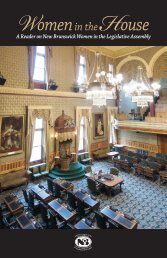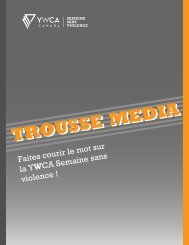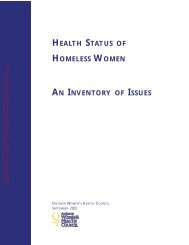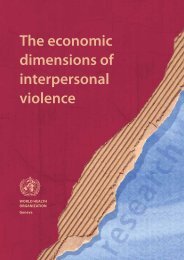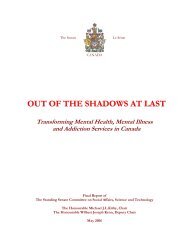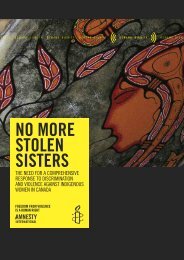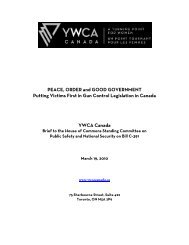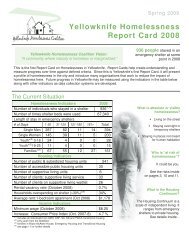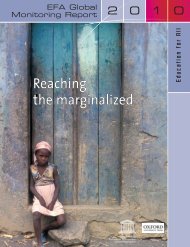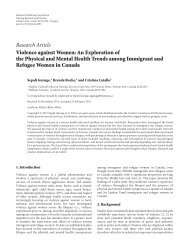Gender Report Card on the International Criminal ... - YWCA Canada
Gender Report Card on the International Criminal ... - YWCA Canada
Gender Report Card on the International Criminal ... - YWCA Canada
Create successful ePaper yourself
Turn your PDF publications into a flip-book with our unique Google optimized e-Paper software.
OTP Situati<strong>on</strong>s and Cases<br />
accompanying audio files, while 2,681 pages of witness<br />
interviews had been provided as audio files, but with<br />
<strong>the</strong> accompanying translati<strong>on</strong> <strong>on</strong>ly in English. 615<br />
On 16 August 2011, Pre-Trial Chamber I issued a<br />
decisi<strong>on</strong> postp<strong>on</strong>ing <strong>the</strong> c<strong>on</strong>firmati<strong>on</strong> of charges<br />
hearing until 16 September 2011 <strong>on</strong> its own moti<strong>on</strong>. 616<br />
The Chamber expressed its ‘profound dissatisfacti<strong>on</strong><br />
with <strong>the</strong> way both parties have behaved regarding<br />
<strong>the</strong>se disclosure issues’, finding that it was inexcusable<br />
that <strong>the</strong> disclosure issue had not been brought<br />
to <strong>the</strong> Chamber’s attenti<strong>on</strong> in sufficient time for<br />
it to be handled properly before <strong>the</strong> c<strong>on</strong>firmati<strong>on</strong><br />
hearing, despite <strong>the</strong> fact that <strong>the</strong> Chamber had<br />
been ‘bombarded’ with filings by <strong>the</strong> Defence <strong>on</strong><br />
comparatively minor issues during <strong>the</strong> relevant<br />
period. 617 The Chamber held that it was compelled<br />
to postp<strong>on</strong>e <strong>the</strong> c<strong>on</strong>firmati<strong>on</strong> hearing ‘in <strong>the</strong> wake<br />
of both parties’ failure to handle <strong>the</strong>ir pre-trial<br />
obligati<strong>on</strong>s in a manner befitting <strong>the</strong> professi<strong>on</strong>alism<br />
demanded when litigating before <strong>the</strong> Internati<strong>on</strong>al<br />
<strong>Criminal</strong> Court’. 618<br />
The Chamber noted that <strong>the</strong> insufficient disclosure<br />
by <strong>the</strong> Prosecuti<strong>on</strong> was known to <strong>the</strong> Defence as early<br />
as 28 June (if not 1 June when <strong>the</strong> initial disclosure<br />
was made), but <strong>the</strong> Defence request to exclude <strong>the</strong><br />
documents was not filed until nine days before <strong>the</strong><br />
c<strong>on</strong>firmati<strong>on</strong> hearing - two m<strong>on</strong>ths after <strong>the</strong> initial<br />
disclosure, and more than a m<strong>on</strong>th after it became<br />
‘abundantly clear’ that <strong>the</strong> Prosecutor was unlikely to<br />
provide <strong>the</strong> documents in <strong>the</strong> requested format and<br />
language in sufficient time to adequately prepare<br />
for <strong>the</strong> c<strong>on</strong>firmati<strong>on</strong> hearing. 619 The Chamber held<br />
that this prol<strong>on</strong>ged lack of reacti<strong>on</strong> from <strong>the</strong> Defence<br />
could legitimately be interpreted by <strong>the</strong> Prosecuti<strong>on</strong><br />
as tacit approval of <strong>the</strong> form of disclosure, and made it<br />
impossible for <strong>the</strong> Chamber to intervene in a manner<br />
that would have enabled <strong>the</strong> Prosecuti<strong>on</strong> to provide<br />
<strong>the</strong> required transcripts or translati<strong>on</strong>s before <strong>the</strong><br />
c<strong>on</strong>firmati<strong>on</strong> hearing. The Chamber thus held that<br />
<strong>the</strong> Defence had failed to exercise due diligence in<br />
asserting its rights, and that its request for disclosure<br />
had not been filed in a timely manner. 620<br />
However, <strong>the</strong> Chamber also held that <strong>the</strong> Prosecuti<strong>on</strong><br />
could not ‘satisfy its disclosure obligati<strong>on</strong>s by turning<br />
over significant porti<strong>on</strong>s of <strong>the</strong> evidence in a way<br />
which is unmanageable for <strong>the</strong> Defence’. 621 By not<br />
providing <strong>the</strong> full French or Kinyarwanda transcripts,<br />
615 ICC-01/04-01/10-378, para 13.<br />
616 ICC-01/04-01/10-374 and ICC-01/04-01/10-378.<br />
617 ICC-01/04-01/10-378, para 15.<br />
618 ICC-01/04-01/10-378, para 15.<br />
619 ICC-01/04-01/10-378, para 17.<br />
620 ICC-01/04-01/10-378, paras 18-19.<br />
621 ICC-01/04-01/10-378, para 20.<br />
<strong>the</strong> Prosecutor forced <strong>the</strong> Defence to work within<br />
a situati<strong>on</strong> where Mbarushimana and his counsel<br />
could not meaningfully discuss <strong>the</strong> c<strong>on</strong>tent of over<br />
60 hours of recorded witness interviews, which were<br />
allegedly important to <strong>the</strong> case. The Chamber found<br />
that, given <strong>the</strong> length of <strong>the</strong> interviews, <strong>the</strong>ir alleged<br />
importance to <strong>the</strong> Prosecuti<strong>on</strong> case, <strong>the</strong> purpose of<br />
<strong>the</strong> c<strong>on</strong>firmati<strong>on</strong> hearing, <strong>the</strong> difficulty in processing<br />
audio recordings ra<strong>the</strong>r than written transcripts,<br />
and <strong>the</strong> Chamber’s decisi<strong>on</strong> of 12 May <strong>on</strong> language<br />
proficiency, 622 <strong>the</strong> Prosecuti<strong>on</strong> had an obligati<strong>on</strong> to<br />
provide Kinyarwanda or French transcripts for all<br />
interviews. The Chamber did not find that it was<br />
necessary for <strong>the</strong> Prosecuti<strong>on</strong> to provide <strong>the</strong> audio files<br />
for interviews for which <strong>the</strong> French or Kinyarwanda<br />
transcripts had already been disclosed. 623 Language<br />
issues also arose in <strong>the</strong> Banda & Jerbo case, discussed<br />
below, and in <strong>the</strong> Katanga & Ngudjolo case, discussed<br />
fur<strong>the</strong>r in Trial Proceedings.<br />
Defence challenge to jurisdicti<strong>on</strong><br />
Al<strong>on</strong>g with <strong>the</strong> challenge to <strong>the</strong> validity of <strong>the</strong> Arrest<br />
Warrant against Mbarushimana, discussed in more<br />
detail in <strong>the</strong> Admissibility secti<strong>on</strong> of this <str<strong>on</strong>g>Report</str<strong>on</strong>g>, <strong>the</strong><br />
Defence filed a moti<strong>on</strong> <strong>on</strong> 19 July 2011 challenging<br />
<strong>the</strong> jurisdicti<strong>on</strong> of <strong>the</strong> Court. 624 The Defence challenge<br />
centred <strong>on</strong> three main arguments: (i) that <strong>the</strong><br />
‘situati<strong>on</strong> of crisis’ which triggered <strong>the</strong> referral of<br />
<strong>the</strong> Situati<strong>on</strong> in <strong>the</strong> DRC to <strong>the</strong> Court in 2004 did<br />
not envisage <strong>the</strong> events in North and South Kivu but<br />
was intended to encompass <strong>on</strong>ly <strong>the</strong> events in Ituri;<br />
(ii) that, even if <strong>the</strong> Chamber were to find that <strong>the</strong><br />
referral of <strong>the</strong> Situati<strong>on</strong> did encompass <strong>the</strong> Kivus,<br />
<strong>the</strong> Prosecuti<strong>on</strong> had not shown that <strong>the</strong> FDLR had<br />
committed crimes prior to 3 March 2004 which could<br />
have c<strong>on</strong>tributed to <strong>the</strong> ‘situati<strong>on</strong> of crisis’ triggering<br />
<strong>the</strong> referral; and (iii) that, given <strong>the</strong> above arguments,<br />
an insufficient nexus existed between <strong>the</strong> charges<br />
against Mbarushimana and <strong>the</strong> scope of <strong>the</strong> Situati<strong>on</strong><br />
in <strong>the</strong> DRC. 625 The Prosecuti<strong>on</strong> dismissed <strong>the</strong> challenge<br />
to jurisdicti<strong>on</strong> as baseless, and argued that <strong>the</strong> DRC<br />
had not limited <strong>the</strong> temporal or geographic scope of<br />
<strong>the</strong> referral and was in fact cooperating with <strong>on</strong>going<br />
Prosecuti<strong>on</strong> investigati<strong>on</strong>s in <strong>the</strong> Kivus, and that<br />
<strong>the</strong> case fell ‘squarely within <strong>the</strong> jurisdicti<strong>on</strong> of <strong>the</strong><br />
Court’. 626 In c<strong>on</strong>fidential observati<strong>on</strong>s <strong>on</strong> <strong>the</strong> Defence<br />
challenge submitted to <strong>the</strong> Chamber, representatives<br />
of <strong>the</strong> Government of <strong>the</strong> DRC c<strong>on</strong>firmed that <strong>the</strong><br />
referral gave <strong>the</strong> ICC jurisdicti<strong>on</strong> ‘over any and all<br />
crimes committed in <strong>the</strong> territory of <strong>the</strong> DRC, including<br />
622 ICC-01/04-01/10-145.<br />
623 ICC-01/04-01/10-378, paras 20-22.<br />
624 ICC-01/04-01/10-290.<br />
625 ICC-01/04-01/10-451, para 6.<br />
626 ICC-01/04-01/10-320, paras 1-4.<br />
152







